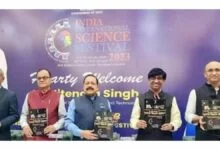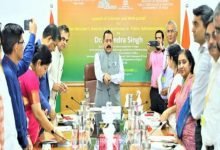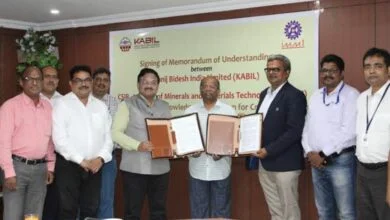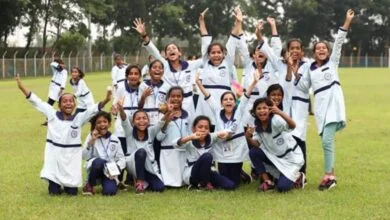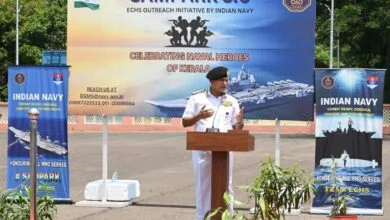Union Minister Dr Jitendra Singh says marine minerals from coastal and ocean sources will be key to India’s future economy
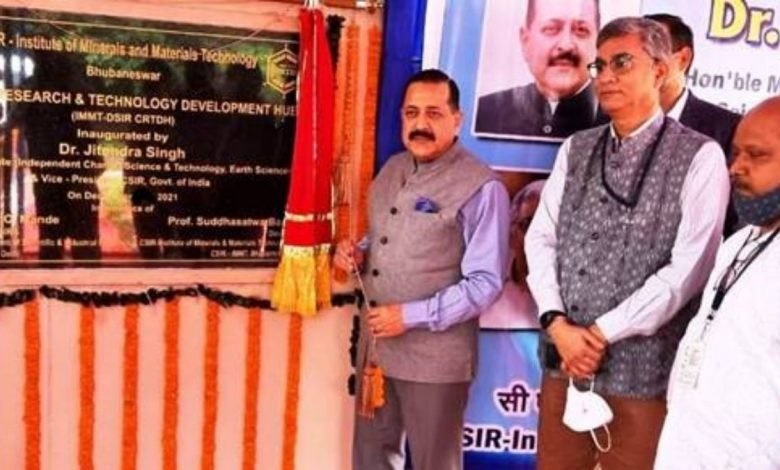
India has emerged as one of the frontline nations in marine scientific research under Prime Minister Narendra Modi: Dr Jitendra Singh
Union Minister of State (Independent Charge) Science & Technology; Minister of State (Independent Charge) Earth Sciences; MoS PMO, Personnel, Public Grievances, Pensions, Atomic Energy and Space, Dr Jitendra Singh said that marine minerals from coastal and ocean sources will be key to India’s future economy. In addition, he said, metals like nickel and cobalt play an important role in promoting renewable energy technologies needed to fight the climate change challenges.
Inaugurating the new building facilities at CSIR-IMMT (Institute of Minerals & Materials Technology) at Bhubaneswar, Dr Jitendra Singh told the scientists and students that IMMT is an R&D Lab of national importance in minerals and materials technology under the aegis of CSIR to address the problems of the industry for their sustainable development.
Dr.Jitendra Singh said that India has emerged as one of the frontline nations in marine scientific research under Prime Minister Narendra Modi and is now actively engaged in exploring the resourceful ocean bed for meeting the country’s future energy and metal demands. Dr Jitendra Singh said the “Deep Ocean Mission” initiated by the Modi government heralds yet another horizon to various resources to enrich the “Blue Economy”.
The Minister inaugurates new building facilities at CSIR-IMMT (Institute of Minerals & Materials Technology) at Bhubaneswar
Dr Jitendra Singh said that steps are being taken for close coordination and collaboration between IIMT and NIOT (National Institute of Ocean Technology), Chennai for accelerated progress in developing India’s blue economy and harnessing its ocean resources. Dr Jitendra Singh said efforts are on for the development of suitable technologies for effective mining of some of the deep-sea mineral resources and exploitation of gas hydrates resources.
It may be recalled that in October this year, the Minister launched India’s First Manned Ocean Mission Samudrayan at Chennai to carry out deep ocean exploration of the non-living resources such as polymetallic manganese nodules, gas hydrates, hydro-thermal sulphides and cobalt crusts, located at a depth between 1000 and 5500 meters.
Dr Jitendra Singh said that over the last seven years, the main thrust of R&D at CSIR-IMMT has been to empower Indian industries to meet the challenges of globalization by providing advanced and zero waste process know-how and consultancy services for commercial exploitation of natural resources through the public-private-partnership (PPP) approach. Dr Jitendra Singh said that such engagement and the technological intervention provided to the industry has made CSIR-IMMT, the first choice for many of the minerals and extractive metallurgy based industries. It is also carving out a niche in the processing of advanced materials for greater value addition and working on resource use efficiency of critical raw materials, he added.
Says, IMMT is a R&D Lab of National Importance in minerals and materials technology to address the problems of industries for their sustainable development
The Common Research and Technology Development Hub (CRTDH) has been established at CSIR-IMMT, by the joint effort of CSIR-IMMT and the Department of Scientific and Industrial Research (DSIR), Government of India in order to provide, technological solutions, to mentor entrepreneurs/startups, alongside facilitating incubation of startups. Its primary objective is to nurture and promote innovations in MSMEs and provide them R&D or knowledge-based support in the area of new materials and chemical processes. The aim is three-fold:
● R&D & Knowledge-based Support to MSMEs & Start-ups
● Mentor, nurture, collaborate, or hand-hold MSMEs to develop innovations
● Provide enabling services such as IPR support, Laboratory facilities, testing and analysis support for quality assurance, auditing of existing production processes etc.
Currently, under the CRTDH program, many collaborative projects with Metallurgical/Agro/Boiler/Electronic/Minerals- MSMEs/Start-ups, focusing on the development of new materials, coatings, agro-waste to wealth (K-enriched fertilizer), electronic waste to wealth (recovery of precious metals) etc are being undertaken. It has provided more than 4 technological solutions to agro and metallurgical/minerals industries and 10 know-hows related to fighting against COVID like sanitisers, liquid soap, disinfection kits etc. to around 14 MSMEs since its inception.
Transmission Electron Microscope (TEM):
Transmission Electron Microscope (TEM) is high-end characterization equipment that has been procured to create an advanced characterization facility in order to augment the R&D activities of the institute with the latest developments.
Being an advanced technique, the TEM facility of CSIR-IMMT is capable of evaluating material structures, phase composition, and texture etc. at nanoscales. It can characterize magnetic nanoparticles using the Lorentz lens and can extract simultaneous information of the surface and bulk 3D information. This facility will open new scopes in modern research opportunities for the scientists, research scholars, and faculties of educational institutes as well as industries engaged in material development and shall enable Knowledge Generation, Human Resource Development, ECF generation, Publications/Patents, New R&D opportunities.
Disclaimer : This is an official press release by PIB.

